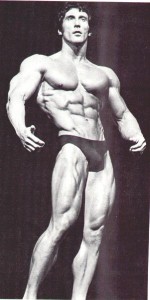Since writing 11 Training Tips for the Skinny Fat Ectomorph, I’ve been bombarded with questions that go something like this: “Hey man, what you said in that article describes me perfectly. What routine should I go on?” Big news: escaping the skinny-fat fate is more than performing a sequence of exercises, it’s living a certain lifestyle. [...]
 Since writing 11 Training Tips for the Skinny Fat Ectomorph, I’ve been bombarded with questions that go something like this: “Hey man, what you said in that article describes me perfectly. What routine should I go on?”
Since writing 11 Training Tips for the Skinny Fat Ectomorph, I’ve been bombarded with questions that go something like this: “Hey man, what you said in that article describes me perfectly. What routine should I go on?”
Big news: escaping the skinny-fat fate is more than performing a sequence of exercises, it’s living a certain lifestyle. So to help my skinny-fat brethren, I’m introducing the “Solutions for the Skinny Fat Ectomorph” series. What you’re reading now is Part I – The Basics. It’s not flashy, but it’s a necessary first step in a long journey. There’s no “routine.” No “diet.” Those things come later. Right now you need to know the why behind the how.
THE USUAL SUSPECT
Here are the defining skinny fat ectomorph traits:
- Apparently thin in clothes, but bare skin reveals otherwise
- Small wrists
- Tall(er)
- Weak and non-muscled arms
- Love handles, lower stomach, and lower chest are main areas of fat accumulation

Before moving on, I have a confession: I was once a skinny fat ectomorph. (I’ll show pictures of my own journey soon enough.) I suffered through the talks of being “lanky.” And, by the way, the world should know the word “lanky” is a verbal knife for a tall and skinny person wanting to bulk up, even if it has complimentary intentions. “Bob’s not fat! He’s lanky!” Meanwhile, Bob is wallowing in sorrow, succumbing to syringes full of steroids. This is why life as a skinny-fat is tough. We’re at the mercy of lanky and the reality of chubby.
Most of my life, I ignored my unique body composition while questing for the holy grail of training programs. Anytime I saw a jacked dude I was hooked. I needed to know his routine because I thought a magical sequence of exercises was going to cure my problem. But during my expedition, I noticed something: most figureheads that undergo massive transformations are very lean beforehand. Here are some examples:
Now, I have tremendous respect for the people listed. What they did, regardless of the starting point, takes hard work and dedication. But their prior body composition can’t be ignored. They can follow normal “bulking” rules because they aren’t likely to store fat. So when these people load their plates with pasta and peanut butter and jelly sandwiches and see amazing results, it’s no wonder this advice gets passed down to those on the lower end of the genetic totem pole. Yet if we follow a similar plan, we end up looking like dirty bulk kid.
WHERE SKINNY-FATS GO WRONG
I’m going abstract here and saying that skinny fat ectomorphs aren’t hindered by a lack of training and nutrition knowledge; they are hindered by a lack of psychological togetherness. Skinny-fats carry large emotional baggage about themselves and their body composition. They don’t stand a chance.
From a nutritional standpoint, skinny fat ectomorphs are a wreck. They will do damn near anything to get rid of their “pouch.” A skinny-fat asked me for tips on Facebook the other day. He gave me his daily food intake:
My diet right now is:
Breakfast: 6 egg whites, 1/2 cup oatmeal
Snacks: 2 scoops protein
Lunch and Dinner: Shrimp and broccoli
Let’s break this down:
- 6 egg whites ~ 120 kcals
- 1/2 cup oatmeal ~ 300 kcals
- 2 scoops of protein ~ 250 kcals
- Shrmimp and broccoli x 2 ~ 300 kcals x 2 = 600 kcals
So we have a young, handsome lad eating a paltry 1000-or-so kcals per day and failing to lose weight. I’d guess this person is either very under muscled or obsessing over the tiniest bit of fat around their lower abs. Both showcase the dysfunctional mindset and damaging habits skinny-fats carry.
LIFESTYLE & PSYCHOLOGY
I don’t mean to go all Dr. Phil on you here, but understanding the stress response is an important part of understanding how to optimize physiology for muscle growth and fat loss. If you’re a constant subordinate filled with inadequate feelings, you’re losing out. This is troublesome, as skinny-fats often feel this way.
Worrying about the perfect routine. Worrying about losing weight. Worrying about gaining muscle. Worrying about what others are doing. Worrying about what others are saying. Worrying about their current body composition. Worrying about girlfriends. Worrying about gossip.
Sound familiar? Trust me, I get the e-mails. I know how you think. But this is a double whammy. Not only does it screw with your immediate physiology, but it also lessens your chances to follow through with, and dedicate yourself to, your training.
“I’ve been on this program for two weeks and nothing is happening!”
It takes longer than two weeks, Honey.
So on the lifestyle front, find a group of loving people to be around, whether it’s your family or friends (that don’t push you to get shitfaced three nights every week). De-stress yourself. Meditate. Take care of other people. Get a little cocky too. Don’t be an arrogant alpha-male. Just have a quiet confidence. Most of all trust in the process.

Do yourself a favor and pick up Why Zebras Don’t Get Ulcers. It’s one of the best training texts you can read, even though there’s no mention of training. It’s a book about stress and adaptation. And lifting weights, getting stronger, losing fat, and increasing performance—everything you want this article series to be about—is rooted in stress and adaptation. It’s important stuff.
TROUBLESOME TRAINING
In general, we get fat from eating more energy than what our body needs. (There are a lot of other things that affect this situation, but we’re simplifying.) The body is stingy. It won’t waste extra energy. So it stores the energy as fat just in case the rapture actually comes to pass. The body cares only cares about survival. If you want to be muscular with a low body fat, you have to live a lifestyle that trips the body into thinking, “the only way I can survive is if I have capable muscle with little excess weight.” Most people miss this.
Living a sedentary life tells the body that carrying around sacks of fat won’t damage its immediate ability to survive. But start running hill sprints—a reincarnation of primitive hauling ass from a chasing lion—and carrying those fat sacks suddenly hinder survival.
Excuse me while I go on a quick broscience rant:
<broscience rant>
Exercise, for all intents and purposes, doesn’t burn many calories. Most people can easily forego the Tastykakes and see the same net caloric reduction. So here’s the question: Does exercise cause fat loss because it burns calories? Or does it cause fat loss because the body recognizes that weighing less is better for survival? After all, we lift weights—which “burns” calories—and yet our muscles grow. So just because something has a metabolic cost doesn’t mean it’s all in the name of fat loss and catabolism. If our muscles grow to better survive the external stressor (weighted barbell), couldn’t our fat also “shrink” to better survive the external stressor? Let’s paint this.
Say you run ten hill sprints. Sure, you’re burning calories. But, to your body, what do the hill sprints mean? From a primitive standpoint, they probably mean you’re either escaping danger or trying to catch food—two things essential for survival. I doubt the Aztecs ran up and down mountains in the name of “hardcore” hill sprints and getting a visible six pack. So does fat loss come from the body’s attempt to better survive the stressor? Or from the calories it uses for energy?
The other side of the equation is nutrition. No matter how many sprints you run, the body isn’t going to lose weight if you’re consistently overstuffing yourself. From a primitive standpoint, overfeeding probably means a hibernation is near. So your body thinks you’re overfeeding for a reason—that it’s going to need the energy down the line because food won’t readily be available. The opposite of this—grossly underfeeding yourself—isn’t optimal either because the body assumes famine. It’s going to hold, and be efficient with, what energy it has for as long as possible, never knowing when proper nourishment will come. This is why very low calorie diets don’t often work for anyone but the morbidly obese.
Signed, Anthony Mychal M.D. Ph.D. Program Coordinator at Broscience University
</broscience rant>
Ahem, back to reality. Gaining muscle is also a survival mechanism. It doesn’t want to be squashed meat under a barbell, so it gets stronger. This adaptation can happen in two ways: improving the nervous system or improving the muscular system. If the right hormones are floating around, these adaptations happen simultaneously. Muscle, however, is metabolically expensive. The body won’t build it unless it knows it has the proper nutrient flow. But I’ll save this discussion for later.
PUMPING IRON
Skinny fat ectomorphs need to help on three levels: mindset, nutrition, and training. Hopefully, after reading this article, you have better grasp on how to carry yourself and live your life. It’s about time to break through and recreate your hormone profile, as your current one gives Aunt Tilly a run for her money.
So control unnecessary stress, gain some confidence, have some faith in what you’re doing, and find a caring network. When you see the guys in Pumping Iron living the good life seemingly without stress, ordering 12 eggs and a pound of steak for lunch, lounging and relaxing by the beach, being idolized by women, and growing into a tightly connected group of friends, it’s no wonder they were successful (steroids aside).
+++++
Other articles in the series:
- Solutions for the Skinny-Fat Ecto, Part II – My Story
- Solutions for the Skinny-Fat Ecto, Part III – Training
- Solutions for the Skinny-Fat Ecto, Part IV – Nutrition
=====
Accompanying resource: The Skinny-Fat Solution

